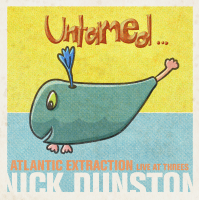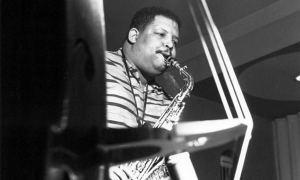Home » Jazz Articles » So You Don't Like Jazz » Jazz is a Joke
Jazz is a Joke

Jazz is a Joke
The sad truth is that jazz has become a cheap punchline. For example, here is some dialogue from The Big Bang Theory, perhaps the most successful global television sitcom of the past decade:Amy: "Well just because our theory was wrong that doesn't mean you're wrong about everything."
Sheldon: "Doesn't it? You know I've always thought I hated jazz, maybe I was wrong. Maybe it's great to hear all the notes at once." [Plays a cacophony of blaring horns as the audience laughs.]
Here's another example from YouTube of Fred Armisen, a former Saturday Night Live cast member, doing a comedy routine: "I'm not a fan of jazz and I don't think anyone in this room is a fan of jazz, and I don't think anyone really likes it, it's a role we all play, we all act like it's part of our lives, but my problem with jazz is that it sounds like itself. It sounds like jazz, when I hear it, I don't think 'Oh, I love this song.' I think ah that's jazz." [audience laughs]
Don't forget, Fred Armisen isn't just any comedian, he's also a musician, the one-time drummer of the punk rock band Trenchmouth—so he hears jazz as a musician. Full disclosure, I'm not a fan of Trenchmouth, my problem is that Trenchmouth sounds like trench mouth.
Easy Target
The question of why jazz is fair game for comedians is intriguing, especially in this age of political correctness. After all, in our PC climate a seemingly innocuous remark can trigger a situation that might land someone in a viral video, the ER, or a holding cell. That's got to make life especially tough for comedians and comedy writers, after all, their bread and butter is pushing peoples' buttons by pushing the envelope. It's a long tradition, medieval kings had their court jesters, as did the ancient pharaohs. They got away with speaking truth to power by cloaking it with humor. Times have changed, nowadays comedians, with a few notable exceptions such as Dave Chappelle and Ricky Gervais, tend to select their targets with caution.Given that, you wouldn't think comedians would dare to prey upon an art form so inextricably linked with the African American community, and arguably one of the greatest cultural achievements of the 20th century. For example, could you imagine Native American music being slammed in today's cultural climate? Yet that's where we find ourselves, comedians and sitcom writers blithely mock and ridicule jazz.
Unfortunately, the grim reality is that these broad brush put-downs of jazz shape perceptions and reinforce stereotypes in young minds. Although I don't have an answer as to why, I do have a hunch. Admittedly jazz and classical music snobs make for ideal targets, but my guess is that it's simply because jazz has been around so long. Even though there are plenty of younger fans, jazz is portrayed as the music of peoples' parents, grandparents and even great grandparents, and ragging on old people is one of the few forms of prejudice that won't provoke the ire of the PC police. Thus, it's a safe and easy target.
What to do?
It's helpful to be familiar with the music collection of someone you'd like to introduce to jazz. Once you identify someone's tastes, then without even mentioning jazz, you can introduce them to jazz you suspect they might like. Equally important, if you research music history you can often find jazz connections to someone's favorite non-jazz musicians. We'll do plenty of that in future columns.Remember, babies don't start out eating steak, they are given milk and soft foods they can digest. If someone tells you they don't like jazz, don't fixate on "jazz" as a word. Jazz is so broad that it offers nearly endless possibilities, simply look for jazz and jazz influenced music that is suitable for a developing palate. One size does not fit all, a teenage guitar-head might be ready for Oz Noy or Wayne Krantz, while a globetrotting yoga instructor will likely need something softer.
It's worth recalling that Pat Metheny won two Grammy Awards in the New Age category. Chances are there were a lot of people who also fell in love with his album Still Life (Talking) 1987, Geffen, unaware they were listening to an acclaimed jazz artist. Without fanfare, play that album for your friend or significant other who claims to dislike jazz. When the time is right, you can casually mention it won a Grammy in the jazz category, and was #1 on the jazz charts in 1987.
Jazz Where You Least Expect It
If you are a music lover and not hung up on labels, you might agree that music is analogous to the ocean. We give names to oceans, but in reality there is one body of water that surrounds our planet. Our oceans are similar to the labels we give music, as concepts they are useful and meaningful, but naming oceans also causes us to oversee the big picture—we are surrounded by one body of water. Musicians navigate along different currents, but music, like water, flows around the planet and these various currents mix. At times the results are serendipitous, as when jazz saxophonist Kamasi Washington covered Claude Debussy.In any case, jazz has deep roots and has exerted a profound influence on other musical genres. That can be used as a bridge to reach music lovers who haven't yet discovered jazz. It is a safe bet most young people have no idea hip hop has jazz roots. For example, Gil Scott-Heron is acknowledged as one of the major progenitors of hip hop. He was a jazz poet and songwriter who fused the spoken word with elements of jazz, funk, and blues. Even today, fifty years after it was recorded, his song "The Revolution Will Not Be Televised" is still influential, and I would be surprised if at some point Kamasi Washington hadn't been influenced by his song "We Almost Lost Detroit."
Gil Scott-Heron also influenced pop/rock artists. Here, for example, is a 2012 clip of Daryl Hall performing Scott-Heron's "Lady Day and John Coltrane" with the vocalist Rumer. It's from Gil Scott-Heron's first studio album Pieces of a Man 1971, Flying Dutchman Records.
Staying with Daryl Hall and pop/rock connections to jazz, here is a clip of him joined by guests from the Average White Band performing "Pick Up the Pieces" demonstrating funk can be just another four-letter-word for jazz. By the way, I interviewed Eliot Lewis for All About Jazz, he is a multi-instrumentalist who plays keyboards for Daryl Hall, but was also in the Average White Band for 13 years playing, bass, keyboards, and guitar.
Tags
So You Don't Like Jazz
Alan Bryson
Oz Noy
Wayne Krantz
pat metheny
Kamasi Washington
Gilbert Scott- Hero
Average White Band
Eliot Lewis
PREVIOUS / NEXT
Support All About Jazz
 All About Jazz has been a pillar of jazz since 1995, championing it as an art form and, more importantly, supporting the musicians who make it. Our enduring commitment has made "AAJ" one of the most culturally important websites of its kind, read by hundreds of thousands of fans, musicians and industry figures every month.
All About Jazz has been a pillar of jazz since 1995, championing it as an art form and, more importantly, supporting the musicians who make it. Our enduring commitment has made "AAJ" one of the most culturally important websites of its kind, read by hundreds of thousands of fans, musicians and industry figures every month.























